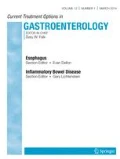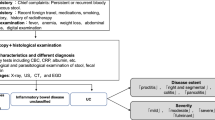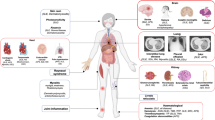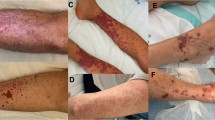Opinion statement
Patients with severe ulcerative colitis should be hospitalized and treated with intravenous corticosteroids for 7 to 10 days. Patients who fail to respond may be offered colectomy or rescue therapy with intravenous cyclosporine. Risks of cyclosporine therapy, including a 1% to 2% risk of death from opportunistic infection and a 50% failure rate after 6 months of follow-up, should be discussed with the patient. Because of the high rate of relapse, patients who elect to be treated with cyclosporine should receive overlapping therapy with prednisone, cyclosporine and azathioprine or 6-mercaptopurine. Azathioprine or 6-mercaptopurine should then be continued long-term for maintenance of remission.
Similar content being viewed by others
References and Recommended Reading
Truelove SC, Witts LT: Cortisone in ulcerative colitis: final report on a therapeutic trial. Br Med J 1955, 2:1041–1048.
Truelove SC, Jewell DP: Intensive intravenous regimen for severe attacks of ulcerative colitis. Lancet 1974, 1:1067–1070.
Dickinson RJ, Ashton MG, Axon ATR, et al.: Controlled trial of intravenous hyperalimentation and total bowel rest as an adjunct to the routine therapy of ulcerative colitis. Gastroenterology 1980, 79:119–1204.
McIntyre PB, Powell-Tuck J, Wood SR, et al.: Controlled trial of bowel rest in the treatment of severe acute colitis. Gut 1986, 27:481–485.
Dickinson RJ, O’Connor HJ, Pinder I, et al.: Double-blind controlled trial of oral vancomycin as adjunctive treatment in acute exacerbations of ulcerative colitis. Gut 1985, 8:1380–1384.
Chapman RW, Selby WS, Jewell DP: Controlled trial of intravenous metronidazole as an adjunct to corticosteroids in severe ulcerative colitis. Gut 1986, 27:1210–1212.
Mantzaris GJ, Hatzis A, Kontogiannis P, Tridaphyllou G: Intravenous tobramycin and metronidazole as an adjunct to corticosteroids in acute, severe ulcerative colitis. Am J Gastroenterol 1984, 89:43–46.
Lichtiger S, Present DH, Kornbluth A, et al.: Cyclosporine in severe ulcerative colitis refractory to steroid therapy. N Engl J Med 1994, 330:1841–1845. This randomized, double blind, placebo controlled trial of intravenous cyclosporine reports a clinical response in 83% of patients treated with cyclosporine as compared with 0% of patients treated with placebo in the setting of severe steroid refractory ulcerative colitis.
Sternthal M, Kornbluth A, Lichtiger S, Present D: Toxicity associated with the use of cyclosporine in patients with inflammatory bowel disease (IBD). Gastroenterology 1996, 110:A1019. This abstract reports the toxicity associated with intravenous cyclosporine therapy in 111 patients with inflammatory bowel disease.
Stein R, Cohen R, Hanauer S: Complications during cyclosporine therapy for inflammatory bowel disease. Gastroenterology 1997, 112:A1096.
Sandborn WJ: A critical review of cyclosporine therapy in inflammatory bowel disease. Inflamm Bowel Dis 1995, 1:48–63. This article comprehensively reviews the clinical pharmacology and the results of treatment with cyclosporine in patients with inflammatory bowel disease.
Fernandez-Banares F, Bertran X, Esteve-Comas M, et al.: Azathioprine is useful in maintaining long-term remission induced by intravenous cyclosporine in steroid-refractory severe ulcerative colitis. Am J Gastroenterol 1996, 91:2498–2499.
Ramakrishna J, Langhans N, Calenda K, et al.: Combined use of cyclosporine and azathioprine or 6-mercaptopurine in pediatric inflammatory bowel disease. J Pediatr Gastroenterol Nutr 1996, 22:296–302.
Carbonnel F, Lavergne A, Lemann M, et al.: A safe and reliable tool for assessment of severity. Dig Dis Sci 1994, 39:1150–1157.
Alemayehu G, Janerot G: Colonoscopy during an attack of severe ulcerative colitis is a safe procedure and of great value in clinical decision making. Am J Gastroenterol 1991, 86:187–190.
Bousvaros A, Wang A, Leichtner AM: Tacrolimus (FK-506) treatment of fulminant colitis in a child. J Pediatr Gastroenterol Nutr 1996, 23:329–333.
D’Haens G, Lemmens L, Hiele M, et al.: Intravenous cyclosporine (CYA) monotherapy versus intravenous methylprednisolone (MP) monotherapy in severe ulcerative colitis: a randomized, double-blind controlled trial [abstract]. Gastroenterology 1998, 114:A963.
Svanoni F, Bonassi U, Bagnolo F, Caporuscio S: Effectiveness of cyclosporine A (CSA) in the treatment of refractory ulcerative colitis (UC) [abstract]. Gastroenterology 1998, 114:A1096.
Author information
Authors and Affiliations
Rights and permissions
About this article
Cite this article
Sandborn, W.J. Severe ulcerative colitis. Curr Treat Options Gastro 2, 113–118 (1999). https://doi.org/10.1007/s11938-999-0038-x
Issue Date:
DOI: https://doi.org/10.1007/s11938-999-0038-x




